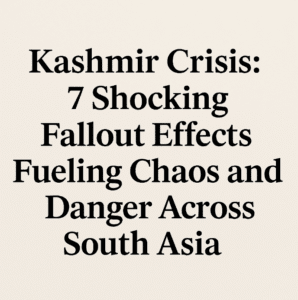Kashmir Crisis: 7 Shocking Fallout Effects Fueling Chaos and Danger Across South Asia
The Himalayan region of Kashmir faces escalating turmoil after a militant attack in Pahalgam killed 26 civilians, prompting India to intensify security crackdowns, including demolishing homes of suspected militants’ families and detaining over 1,500 individuals. Critics condemn the measures as “collective punishment,” exacerbating tensions in a region already strained since India revoked Kashmir’s autonomy in 2019.
India-Pakistan relations have plummeted, with New Delhi suspending the Indus Waters Treaty and Islamabad retaliating by closing airspace and halting trade, raising fears of conflict over shared water resources. Pakistan seeks an international probe with Russian and Chinese involvement, while India accuses it of cross-border terrorism. Media blackouts and allegations of staged encounters deepen distrust among locals, who report worsening alienation and economic hardship. Analysts warn that Delhi’s heavy-handed tactics risk further radicalization, undermining claims of restored normalcy.
Global powers remain hesitant to intervene, leaving Kashmiris trapped in a volatile stalemate with profound humanitarian consequences.

Kashmir Crisis: 7 Shocking Fallout Effects Fueling Chaos and Danger Across South Asia
The Himalayan region of Kashmir is reeling from intensified violence and political turmoil following a devastating militant attack in Pahalgam on April 26, 2025, which killed 26 civilians—the deadliest assault on non-combatants in two decades. India’s retaliatory measures, including home demolitions, mass detentions, and diplomatic escalations with Pakistan, have reignited debates about human rights, regional stability, and the efficacy of hardline security policies.
Security Crackdowns Spark Outcry Over Collective Punishment
Indian forces have blown up at least nine homes in Srinagar, claiming they belonged to Kashmiri militants. Locals, however, argue the destroyed properties belong to families of individuals already imprisoned—a move critics call “collective punishment” targeting entire communities. Protests erupted in Bandipora after a man, described by residents as the brother of a jailed rebel, was killed in what they allege was a staged encounter by security forces.
- Detentions Surge: Over 1,500 Kashmiris have been detained since the attack, including 175 in Anantnag district alone.
- Political Backlash: Srinagar MP Ruhullah Mehdi condemned the demolitions as punitive, while former Chief Minister Mehbooba Mufti urged security forces to avoid conflating civilians with militants.
India-Pakistan Tensions Reach Boiling Point
The attack has triggered a dangerous escalation between nuclear-armed rivals India and Pakistan:
- Diplomatic Rupture: India expelled Pakistani diplomats and suspended visas, prompting reciprocal actions from Islamabad.
- Water Treaty in Jeopardy: India’s suspension of the Indus Waters Treaty—a 1960 pact managing shared river resources—has drawn Pakistan’s sharp rebuke, warning that blocking water flows would be an “act of war.”
- Trade Halts: Pakistan closed its airspace to Indian flights and halted all trade, including third-country transactions.
Pakistan has called for an international investigation involving Russia and China, a proposal India dismisses, insisting on Islamabad’s culpability for “cross-border terrorism.”
Media Blackouts and the Battle for Narratives
India’s Information Ministry banned live coverage of military operations, citing national security—a move critics argue stifles transparency. Meanwhile, Kashmiris report heightened fear and distrust, with social media flooded by videos of razed homes and protests.
The Human Cost of ‘Normalcy’
Since India revoked Kashmir’s semi-autonomous status in 2019, the region has faced increased militarization, internet shutdowns, and arrests. The Pahalgam attack underscores the failure of Delhi’s strategy to quell dissent through force, say analysts.
- Alienation Grows: Experts warn that demolitions and mass detentions risk further radicalizing a generation grappling with unemployment and political disenfranchisement.
- Humanitarian Fallout: Families of detained individuals face economic ruin and social stigma, exacerbating tensions.
Global Implications
The crisis has drawn muted international reaction, but China and Russia’s potential involvement in a probe could complicate geopolitics. The U.S. and EU face pressure to mediate, though their historical reluctance to challenge India’s stance on Kashmir persists.
What Next?
- Risk of Escalation: Any Indian move to divert Indus River waters could trigger Pakistani retaliation, risking military conflict.
- Domestic Reckoning: India’s 2024 elections loom, with Modi’s BJP likely to frame its response as “strong leadership”—a narrative opposition parties may challenge amid growing humanitarian concerns.
- Kashmiri Voices Silenced: Amid media restrictions, local perspectives risk being overshadowed by state and geopolitical narratives.
The Pahalgam attack has exposed the fragility of Kashmir’s uneasy peace. While India seeks to project strength, its tactics risk deepening cycles of violence. For Pakistan, the crisis offers a chance to internationalize the Kashmir dispute—a strategy with limited success historically. Ultimately, civilians on both sides of the Line of Control remain caught in a geopolitical stalemate with no resolution in sight.
You must be logged in to post a comment.